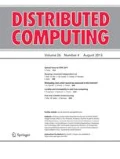Abstract
A probabilistic method is proposed for reading remote clocks in distributed systems subject to unbounded random communication delays. The method can achieve clock synchronization precisions superior to those attainable by previously published clock synchronization algorithms. Its use is illustrated by presenting a time service which maintains externally (and hence, internally) synchronized clocks in the presence of process, communication and clock failures.
Similar content being viewed by others
References
Cristian F (1988) Reaching agreement on processor group membership in synchronous distributed systems. 18th Int Conf on Fault-Tolerant Computing, Tokyo, Japan, (June 1988)
Cristian F, Aghili H, Strong R (1986) Approximate clock synchronization despite omission and performance failures and processor joins. 16th Int Symp on Fault Tolerant Computing, Vienna, Austria (June 1986)
Cristian F, Aghili H, Strong R, Dolev D (1985) Atomic braodcast: from simple message diffusion to Byzantine agreement. 15th. Int Symp on Fault-Tolerant Computing, Ann Arbor, Michigan (June 1985)
Dolev D, Halpern J, Simons B, Strong R (1984) Fault-tolerant clock synchronization. Proc 3rd ACM Symp on Principles of Distributed Computing
Gusella R, Zatti S (1987) The accuracy of the clock synchronization achieved by tempo in Berkeley Unix 4.3BSD. Rep UCB/CSD 87/337
Kinemetrics/Truetime (1986) Time and Frequency Receivers, Santa Rosa, California
Kopetz H, Ochsenreiter W (1987) Clock synchronization in distributed real-time systems. IEEE Trans Comput 36:933–940
Lamport L, (1987) Synchronizing time servers, TR 18. DEC Systems Research Center, Palo Alto, California (June 1987)
Lundelius J, Lynch N (1984) An upper and lower bound for clock synchronization. Inf Control 62:190–204
Lamport L, Melliar-Smith M (1985) Synchronizing clocks in the presence of faults. J Assoc Comput Mach 32:52–78
Lundelius-Welch J, Lynch N (1988) A new fault-tolerant algorithm for clock synchronization. Inf Comput 77:1–36
Marzullo K (1984) Maintaining the time in a distributed system. Xerox Rep OSD-T 8401 (March 1984)
Schneider F (1987) Understanding protocols for Byzantine clock synchronization. TR 87-859, Cornell University (August 1987)
Srikanth TK, Toueg S (1987) Optimal clock synchronization. JACM 34:626–645
Author information
Authors and Affiliations
Additional information
Flaviu Cristian is a computer scientist at the IBM Almaden Research Center in San Jose, California. He received his PhD from the University of Grenoble, France, in 1979. After carrying out research in operating systems and programming methodology in France, and working on the specification, design, and verification of fault-tolerant programs in England, he joined IBM in 1982. Since then he has worked in the area of fault-tolerant distributed protocols and systems. He has participated in the design and implementation of a highly available system prototype at the Almaden Research Center and has reviewed and consulted for several fault-tolerant distributed system designs, both in Europe and in the American divisions of IBM. He is now a technical leader in the design of a new U.S. Air Traffic Control System which must satisfy very stringent availability requirements.
Rights and permissions
About this article
Cite this article
Cristian, F. Probabilistic clock synchronization. Distrib Comput 3, 146–158 (1989). https://doi.org/10.1007/BF01784024
Issue Date:
DOI: https://doi.org/10.1007/BF01784024




